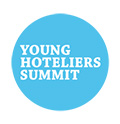Talent Development: Interview with Michael Wale, President of Starwood Hotels & Resorts, EAME
The Young Hoteliers Summit Interview Series

To celebrate their renewed partnership with Starwood Hotels and Resorts, the YHS team
received the opportunity to interview Michael Wale, EAME President. Mr Michael Wale has been a part of Starwood Hotels and Resorts for 35 years, having joined Sheraton as a trainee in London Heathrow in 1978. His career has taken him through progressive management positions in the UK and Ireland, finally become EAME President in June 2013. Career highlights include developing the Vita Futura management trainee program and leading the integration of Le Meridien brand in 2005. YHS thanks Mr Wale for taking the time to talk to us last Monday, 9th December, about his life and career with Starwood, and is looking forward to seeing Starwood return as Royal Partner to the 2014 Summit!Interviewed by Friederike von Bünau, YHS Press Office
Mr Wale, after 35 years, what keeps you passionate about Starwood brand?
That's a very good question! Well why Starwood, and why Starwood for me? I joined as
one of the first graduate trainees in the UK in 1978, and the organization has always been able to offer me an opportunity that expands my horizons - whether laterally through geography, or through stretching me by giving me new challenges in the roles. As a consequence, if you believe in the strategy, the brand and the leadership, and I've been very fortunate in my time - I've always felt challenged and I've always felt valued. I think those are the two things that I needed to keep my own personal enthusiasm up.We did some analysis on our top leadership a few years ago, and we realized that one
of the common threads of everybody's story was that somebody, at some point, had taken a risk on them. I've have at least 2 times in my career where people have taken a risk on me, promoting me a little bit further that my current skillset looked like. They were capable of supporting me and it gives you enormous confidence, if you survived that moment!What was your biggest challenge?
Trying to match your personal life with your professional life is probably one of the
challenges that we all face. As a GM, I loved it, as my family lived in. While they were growing up I could be there with them, as I could pop upstairs and pop downstairs which was nice. I think an organization that allows you to pursue personal interests as well as professional interests is important.Along the way, what was your most interesting experience?
Professionally, it was the acquisition of the Le Méridien brand, leading the global
integration of the Le Méridien brand into Starwood as its 9th brand. Why? To work on a global project, and leverage the relationships I'd built during my tenure with this company, to leverage my knowledge of who were the right people to work on that integration, was what was fun about it. Also, we did a post- integration audit with INSEAD (top European Management School). We hadn't done the integration on an intellectual basis; we did what was right for the business at the time. But, without going through any of the textbooks, we did absolutely everything that they would have suggested. Bar one thing - we should have visited all 130 hotels we were acquiring! But every other step we took, in terms of how we put our team together, how we integrated people, was textbook stuff. It taught me an MBA in life is as good as an MBA at INSEAD.Personally, there are many great stories of the relationships built over the years. I'm an
avid and competitive golfer, so living in Edinburgh, 81 golf courses within 1 hour drive of the hotel, was like paradise to me!Vita Futura has had great success among graduates. What led you to create
the program?Firstly, I was the first of the graduate training program in 1978. When I came off the
program after over two years, the organization didn't know what to do with me. I almost left at that point. They couldn't find me a job; they'd never had such a product before! But I got lucky, one of my first big breaks. I was asked to do training in one of our flagship properties in central London. As a result of being there 3 months, I was offered the job as Front Office Manager. This was more than that one step, equivalent of a few steps up. There I was, after the program, I probably had 50% of the skills I required, but got into a job that was a dream job, a great first step.When I became GM in Edinburgh at the time (as youngest GM in Europe) I thought,
"Where is all the young talent going to come from in the future?". So I started, and we got a great young graduate, so we asked her to design the program that she felt would resonate with fellow graduates, designed by graduates, for graduates. We listened to what the graduates had done before in terms of experience. We banked that, didn't ask them to repeat it, and unlike most, ours is tailor made for the individual.What is your vision for the future of Vita Futura?
I would love to make it go global – for all regions to grow and share talent. I started the
project as a single unit GM, and I could grow it to the UK, I could then grow it to the NW Europe, make it an EAME program and now - global. This is what kept me at Starwood. When people say in an organization, 'can you change the way an organization works?', then the answer to that question is yes, if you're passionate enough about it, and you really want to achieve something different.What, in your opinion, is essential to the profile of an aspiring young hotelier
today?You need to have the right attitude. No one's going to give you anything. Life doesn't
hand you gifts year after year. It might, most of us who have been fortunate enough to be successful in any role, have had the odd gift along the way in the guise of an opportunity, but my advice generally is – you've got to show an enthusiasm and a passion for our business.What makes the difference between a great and a middle of the road trainee is that it
is all about attitude. Clearly you need criteria for entry – bright and intelligent, have proof that you can deliver an entry level qualification, and we like to have language capabilities and flexibility. But when I'm asked if I'd like to participate in this, that, or the other, my answer is automatically yes. It gives me a chance to extend my network to influence the way we run our business, and this all goes under the category of putting yourself in the way of an opportunity. If you've been out there and you've been doing the right thing, I think generally you'll find success.What do feel Hotel schools should teach their students today?
Universities need to stay in touch with industry to reflect the changing dynamics of the
business the digital revolution, the mobile revolution, to ensure the technical skills remain current and appropriate. If anything, it's teaching a more leadership skills, the competencies required to lead people. When I look at some of the very bright graduates, some of them have a sense of entitlement. In my experience, those people with a sense of entitlement don't always succeed to their fullest potential. Yes, it's difficult when you're young, and you're enthusiastic, and you've studied hard, you might feel someone owes you an opportunity, but this doesn't really work. People will need to understand there's a lot of emotional intelligence required to succeed in life, both personally and professionallyOn Generation Y?
I don't buy that! (When I was starting) I was pushy, aggressive, arrogant, but had the
good fortune to have some people who were kind enough to mentor me; that a little less arrogance might be helpful, a little more humility would go a long way. They recognized I had some good skills and attributes, encouraged me to build on those, and taught me how to make best use of them. Generationally, if you're in your 20's, everyone is in a hurry. Maybe the social networking was different, but back then it was all about building networks, we just did it in a different way.Every generation tries to come up with a USP; it's about what a generation wants. Gen Y
doesn't know what it was like to be a boomer. I remember what it was like to be a boomer, maybe in 10 years I won't (!) but I can, and I was certainly pushy and as keen as any young person you come across these days. If anything I was a bit more aggressively ambitious!On hiring?
About the Young Hoteliers Summit
The Young Hoteliers Summit (YHS) was founded in 2010 by five students of the Ecole hôtelière de Lausanne (EHL), who shared the vision of fostering innovation in the industry through insightful discussions between thought leaders and hospitality students. Today, YHS has become the largest student-run summit in the world, inviting over 30 speakers, 80 delegates and 20 partners to its event every year. During the summit, the delegates have to solve the YHS Challenge set by the summit's most esteemed partner, the Challenge Provider. The team behind YHS consists of over 40 students from EHL Hospitality Business School, speaking over 25 languages and coming from 28 countries. They prepare the event for an entire year.
